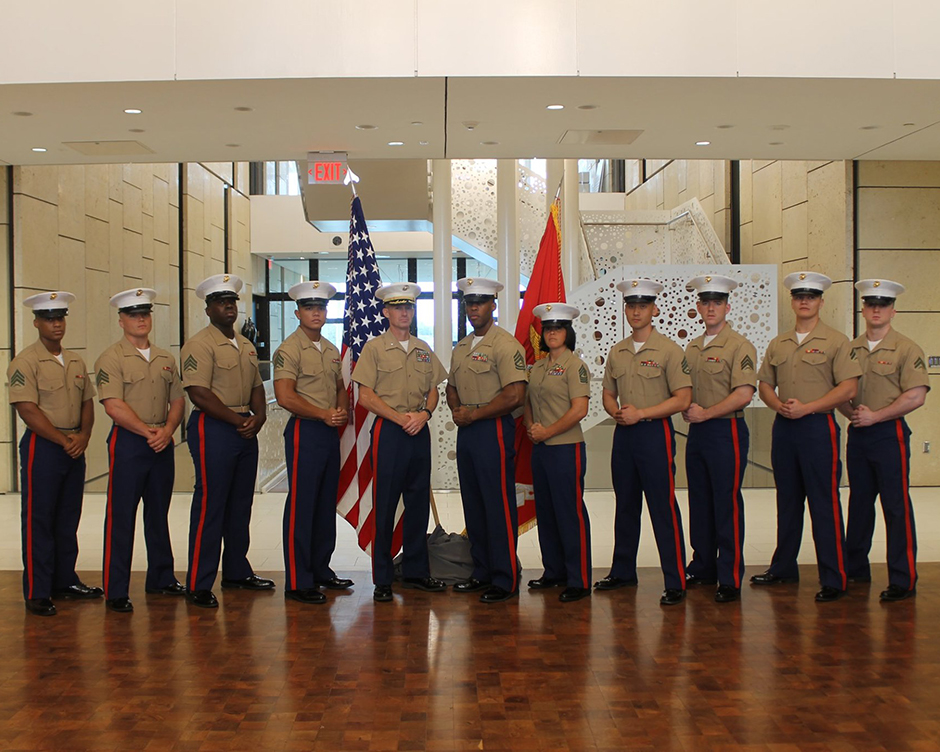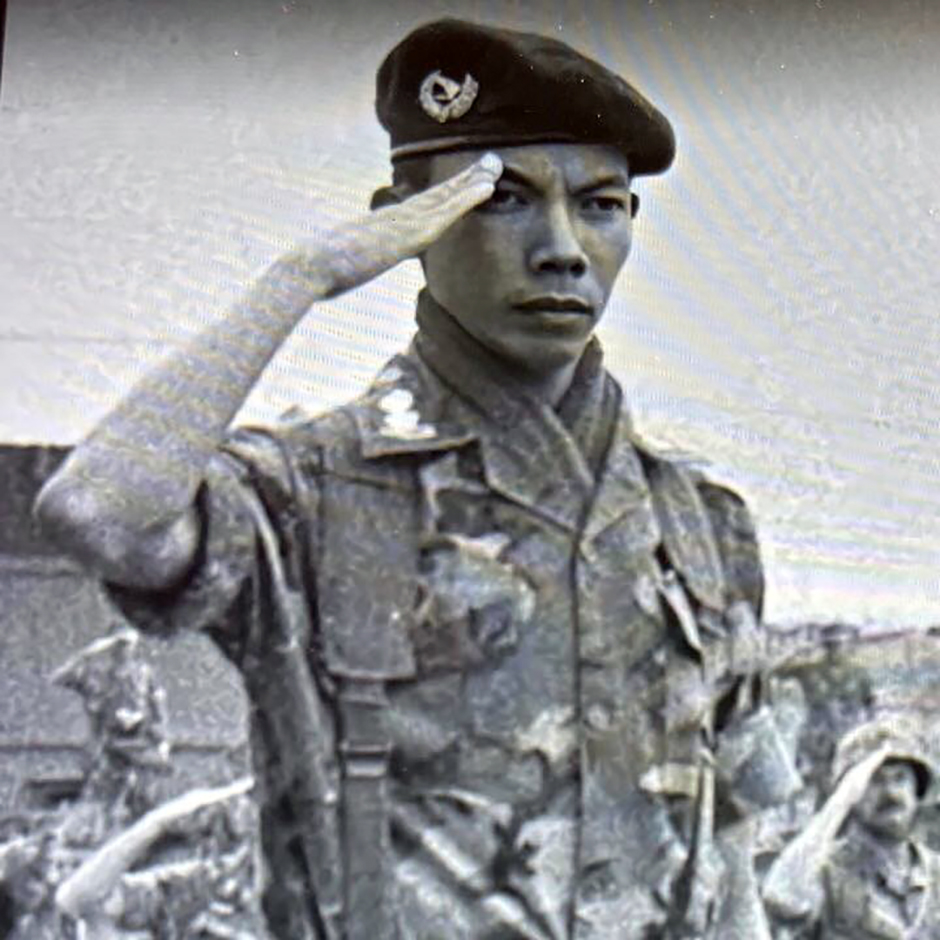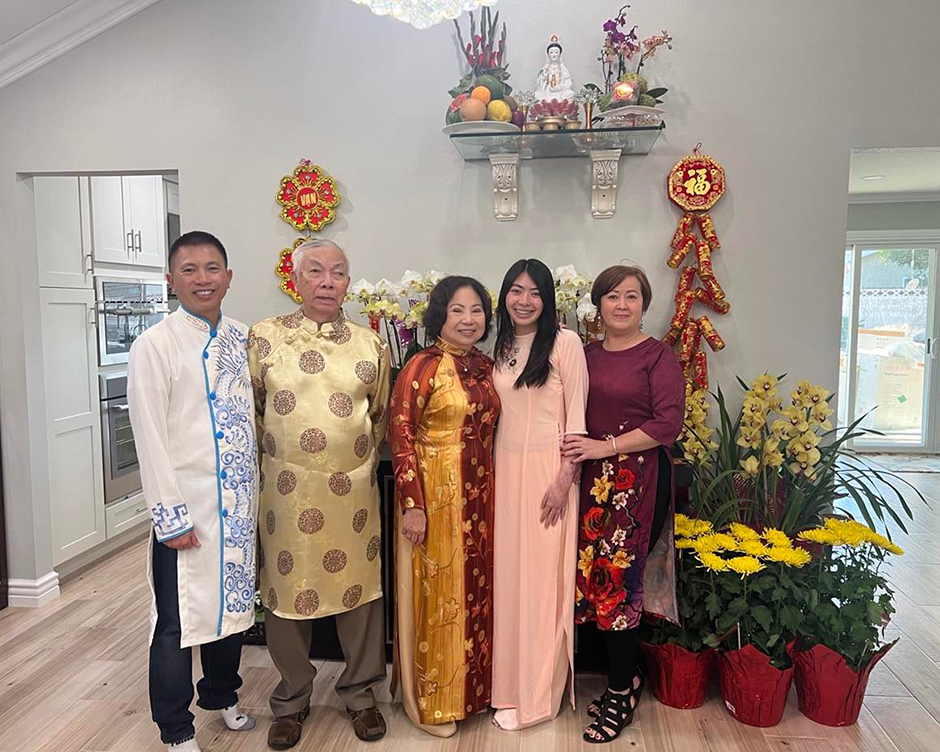UCI Veterans Studies Certificate Program gives voice to unique experiences of those who’ve served
Faculty and students reflect on key takeaways from the three-course series available
to veteran and non-veteran scholars

After serving nine years in the United States Marine Corps, including multiple deployments and posts at four different embassies around the world, UCI sociology major Andrew Truong returned to college with a purpose: get a degree that would put him in a career track helping others. What he didn’t expect to find was a course that helped give voice to his experience as a veteran transitioning back to civilian life.
“I saw an announcement about the Veterans Studies Certificate Program in the school’s monthly enewsletter and it caught my attention,” he says. “The word ‘veteran’ isn’t something you see a lot on college campuses.”
True to Truong’s observation, the Veterans Studies Certificate—launched in 2019—is the first to be offered in the state of California and one of only four such university-level programs out there. Despite numbering more than 18 million strong and representing 7 percent of the nation’s population, U.S. veterans continue to be an underrepresented and understudied group in academia, says UCI social sciences dean Bill Maurer. By creating the certificate program, he and director Anita Casavantes Bradford, professor of Chicano/Latino studies and history, are working to change that narrative.
“What we deem worthy of academic study—and how we approach that—says a lot about what our society values,” says Maurer. “By providing a space for studying and learning about veterans, we are validating this UCI student community. We’re saying to them, ‘You are important.’”
That point is particularly poignant for Casavantes Bradford. As both the daughter and spouse of service members from different eras and a scholar of immigration and critical ethnic studies, she’s passionate about elevating under- and misrepresented voices. She brings a critical lens to bear on the curriculum she’s worked to craft, which draws upon insights from disciplines like Chicano/Latino studies and gender & sexuality studies, as well as more broadly from across the social sciences.
I saw an announcement about the Veterans Studies Certificate Program in the school’s monthly enewsletter and it caught my attention. The word ‘veteran’ isn’t something you see a lot on college campuses.
- Andrew Truong
“In both my professional and personal worlds, I’ve seen how U.S. military veterans are simultaneously hypervisible yet frequently misunderstood,” she says. “Too often, veterans are represented as politicized symbols of what people imagine them to be. By providing space for scholars and students to explore the diversity and complexity of veteran experiences and identities together, we’re challenging these misrepresentations and encouraging a deeper understanding of veterans’ actual experiences.”
Overall, she hopes the program will raise the visibility of the veteran community while helping vets feel more included on campus.
“Like all communities who have been underrepresented, veterans deserve to have classes that help them to see themselves in the curriculum. It’s a way of recognizing that they matter, their experiences are worthy of serious study and reflection,” she says.
The program’s three courses, which can be taken individually or as a series, are open to both veteran and non-veteran students. The courses—which fulfil UCI General Education (GE) requirements - are designed for students desiring to develop a deeper understanding of veterans’ issues and experiences, as well as those aspiring to careers working with this unique community. All courses are taught by veteran or military-connected faculty.
Growing up, my grandfather told us many stories about his time in the war, and when I saw this program and these courses, I was intrigued and happy that I had the opportunity to gain greater perspective.
- Chelsey Nguyen
This past year, veteran studies faculty member Mariana Grohowski taught both the “Veterans’ Voices” and “Veterans in History and Society” courses. Her teaching drew from both her doctoral research on the missing voices of women veterans and personally, from her dad’s experience in Vietnam. In 2015, she launched the Journal of Veterans Studies to give this field a scholarly home and outlet for the dissemination of research, and she continues to serve as editor in chief.
“A lot of students have stereotypes of veterans; they think they know ‘veterans’ when their experience is likely only something learned from movies or hearsay,” she says. “My goal is to help students understand how many veteran experiences there are. We work to challenge stereotypes, and open the door to the diversity, complexity, and history of veteran experiences.”
That message resonated with Chelsey Nguyen, a non-veteran student and psychology major who took both courses in hopes of better connecting with her grandfather’s experience in and after the Vietnam War.
“Growing up, my grandfather told us many stories about his time in the war, and when I saw this program and these courses, I was intrigued and happy that I had the opportunity to gain greater perspective,” she says.
As she completed her coursework, she shared what she was learning with her grandfather. The conversations the course sparked provided a unique link between his past and her present.
“I’m lucky to have grandpa still here with me so I can continue listening to his stories and now, better understand his experience adjusting back into society,” she says. “All of this has helped shape me into a more compassionate person who better understands other peoples’ experiences.”
Veteran studies faculty member Pauline Lubens, ’18 UCI public health Ph.D., feels lucky to have taught the third certificate course, “Veterans in Transition,” for the first time this year. Her course drew from her UCI doctoral research on war and public health and her 35-year career as an award-winning photojournalist documenting the personal impact of war and disasters, humanitarian response, and global health crises. She coupled this with her experience as a policy analyst for Swords to Plowshares, a veterans rights organization and community based non-profit, to bring in real life examples of triumphs and struggles veterans face in their daily lives after separating from the military.
“I was in Iraq a few times and spent a lot of time in the Bay area working on stories about veteran recovery. I became embedded in this community, and it’s been a big part of my world,” she says. “When I talk to my students about issues like veteran homelessness and mental health, it comes from firsthand knowledge.”
In her class, Lubens leaned heavily into her journalism experience by conducting and sharing one-on-one interviews with veterans who’ve transitioned out of the military—some long ago, others more recently.
For Truong, who’d been in a previous section of the course, learning about the complex identities and experiences of those who’ve served proved lifechanging.
“It was incredible being in a class where veterans like me got to share their experiences while also learning about the different aspects that make up the unique identities of each veteran, knowing there’s no ‘one’ experience,” he says. “I highly encourage all students to take this course, especially veterans. It helped me to learn a lot more about myself and it’s proven to be a key that’s been missing as I’ve tried to find my way back.”
To learn more about the UCI Veterans Studies Certificate Program offered through the School of Social Sciences, please visit https://www.undergrad.socsci.uci.edu/certificate_veterans.
- Heather Ashbach, UCI Social Sciences




